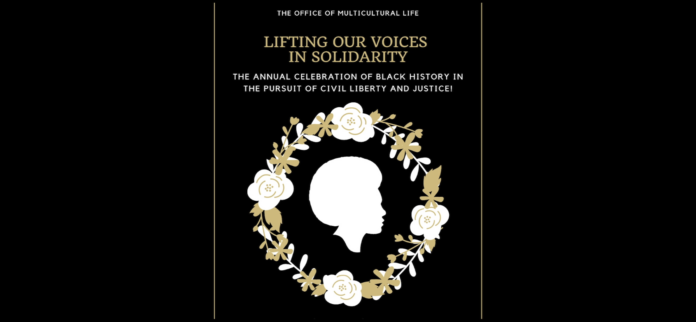In honor of Black History Month, the Office of Multicultural Life (OML) hosted “Lifting Our Voices in Solidarity: The Annual Celebration of Black History in Pursuit of Civil Liberty and Justice!” on Thursday, Feb. 25.
The presentation was roughly an hour and twenty-five minutes in length, and is available on demand through the Office of Multicultural Life’s activities portal. Students and faculty prepared stimulating statements and presentations.
Ushered in by swells of jazz piano, OML director Robin Riley-Casey delivered the opening statements. She explained that the importance of this event was, above all else, its connection to the community.
“You get a chance to understand that history is about what we do today to others,” states Riley-Casey.
Riley-Casey and her colleagues coordinated with other organizations, including the Africana Studies department and the African American business council. Additionally, there was a partnership between businesses in the Lehigh Valley, such as Olympus, Just Born, Keystone Canna Remedies and Air Products which were listed as members of the “Diversity, Equity + Inclusion Collaborative.”
Amber Hikes, the Chief Equity and Inclusion Officer at the American Civil Liberties Union (ACLU), proceeded to address the issues facing the Black Queer community and the Black Trans community, and had positive response for the team at Muhlenberg College involved in putting the presentation together.
“I especially want to acknowledge the brilliant student leaders who were sharing their presentations tonight,” said Hikes. “I am blown away by the strategy, the vision, the leadership of students in [Muhlenberg’s] Office of Multicultural Life and your Black Students Association and your Africana Studies Program.”
Hikes went on to talk about her own work at the ACLU, putting extra emphasis on how her own experiences play a role in her work with the growing movement for liberty. “I need to ask myself: Is this a conversation I could have with a five-year-old… what it comes down to is making sure that people feel like they belong at work; Like we see them, like we value them and care about them.”
The event presented a spotlight for Black artists, and included a few segments to showcase the creativity of community members. First, Richeta Cubano ’24 performed a meaningful slam poem about the impact of long-standing racial tensions between the Black community and law enforcement. Immediately following was a presentation of virtual gospel singing by Eric Thompson ’10, Associate Director of Admissions.
“Ignorance is the root of racism and bigotry,” explained Giovanni Merrifield ’23, in a discussion with Emanuela Kucik, Ph.D., assistant professor of English and Africana Studies. “Many things have not changed, and we, as Black people, are still facing the many residual effects of colonialism, resulting in violence of the police and others who are ignorant, homophobic and transphobic. This ignorance has claimed the lives of Emmett Till, Trayvon Martin, Sandra Bland, Ahmaud Arbery, Breonna Taylor, George Floyd and Jacob Blake… but many people forget about the Black LGBTQIA+ members and the Black women that were lost to this wretched genocide, which are Nina Nopal, TonyMcDade, Monica Diamond, Johanna Metzger, Dominique Remy Fells, Riah Milton, Geraldine Townsend, Hannah Williams, DeCynthia Clements and unfortunately many more.”
Attendees split off into Zoom breakout sessions where the presentation and the display featured quotes from Black leaders and artists, such as Eartha Kit, Nipsey Hussle and Dr. Martin Luther King, Jr. until the program’s return.
Finally, a closing speech heralded by the words “A call to action,” was given by Equity Facilitator Camilla Greene. Shespoke about coming to her own childhood realizations about racial inequality through elders at her Baptist church in Brooklyn, New York.
“There’s an African saying that the young bird does not crow until it hears the old ones… My generation was very different from my grandparents’ or my parents,’ …and the call to action was different.”
Danny Milkis '23 is a Media & Communication student at Muhlenberg who has a specific interest in writing and journalism. In high school, he took part in extracurricular writing whenever possible, and received a Metropolitan Award nomination for his work as a Student Performing Arts Critic. He is ecstatic to have joined the staff of talented writers and editors at the Muhlenberg Weekly, and is excited to learn from this wonderful group of knowledgeable individuals throughout his time at Muhlenberg.






















